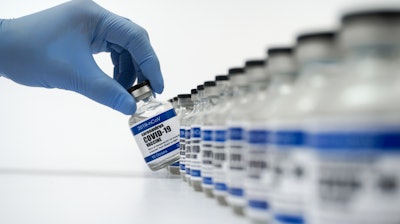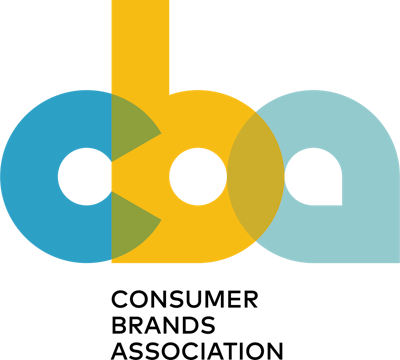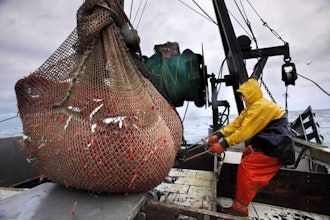
Geoff Freeman, president and CEO of Consumer Brands Association, sent the following memorandum letter on Wednesday to the coordinator for the Biden White House Coronavirus Response team. The memo details the role of consumer brands' frontline essential workers in the United States' supply chain and COVID-19-
Read the memo in full below:
To: Jeffrey Zients, Coordinator White House Coronavirus Response
From: Geoff Freeman, President and CEO, Consumer Brands Association
The consumer packaged goods (CPG) industry welcomes the Biden administration’s desperately needed COVID-19 leadership and we stand ready to support your efforts. Based on our recent experiences, we offer five concrete solutions for deploying an effective and cohesive national vaccine strategy.
Background
Our 1.7 million frontline essential workers are recognized by the Centers for Disease Control and Prevention (CDC) as a workforce that commonly works in close proximity to others and is at higher risk for work-related exposure, which has led to the designation of Phase 1b in CDC’s Updated Interim Recommendation for COVID-19 Vaccine Allocation. Our critical and diverse workforce makes life-sustaining products indispensable to pandemic response, such as food, beverages, disinfectants, cleansers, hand sanitizer, toilet paper and personal hygiene products.
Despite a COVID-19-related absentee rate of around 10%, the CPG industry continues to meet extraordinarily high demand as manufacturing facilities remain open throughout the pandemic, with employees working around-the-clock to ensure that store shelves remain stocked with the products Americans need.
With manufacturers operating in all 50 states, the industry feels firsthand the impact of an inconsistent vaccination program.
5 Concrete Solutions
1. Provide federal incentives to state and local jurisdictions for adherence to COVID-19 vaccination phases outlined by the CDC Advisory Committee on Immunization Practices. Vaccination “traffic jams” are delaying protection for vulnerable frontline essential workers as companies and their employers must navigate a jurisdictional patchwork of ambiguous approaches to vaccination eligibility. Many state and county jurisdictions have outright de-prioritized frontline essential workers.
2. Incentivize the use of a uniform system for identifying and registering eligible vaccine recipients. Currently, the CPG industry is working to ascertain separate jurisdictional registration and reporting requirements necessary to coordinate vaccinations for their employees. A uniform system for registering eligible vaccine recipients would simplify how the CPG industry would register employees across jurisdictions, provide accurate estimates of vaccine needs and allow consistent, accurate information to be shared. This uniform system must allow for alternative forms of employee communications – importantly mobile phone numbers – for vaccine notifications and tracing initiatives.
3. Partner with CPG manufacturers to amplify a robust, multilingual, multicultural vaccine education campaign that leverages third-party validators, religious organizations and other non-governmental leaders. CPG employers have initiated surveys of frontline essential workers and identified significant vaccine hesitancy among ethnic and racial minorities. Vaccine acceptance has ranged between 20% and 40%. Employer-based incentives for vaccinations may help but will not supersede historical mistrust of vaccines and healthcare systems.
4. Provide states clear projections about the availability of vaccine to permit employers to accurately register, educate and facilitate the vaccination of frontline workers. States are currently unaware of vaccine quantities beyond a one-week timeframe, inhibiting planning and coordination between employers, employees and vaccine providers. Further, certain rural jurisdictions, where many manufacturing facilities are located, have received small vaccine allocations weeks after the national initiation of Phase 1a.
5. Prioritize public-private partnerships to assist federal, state and local authorities to overcome distribution challenges and improve supply chain resiliency. The business community’s supply chain expertise and infrastructure should be leveraged to ensure the timely and efficient mass vaccination of the frontline essential workforce.
Strongly Support Biden Administration Efforts
The next few weeks are among the most critical in controlling the spread of COVID-19. The CPG industry supports the federal leadership proposed by President Biden in the successful execution of the National Strategy for the COVID-19 Response and Pandemic Preparedness. Consumer Brands and its members are committed to advancing a successful vaccination campaign to protect our frontline essential workers and prevent disruptions to the availability of the essential items that are critical to the wellbeing of the nation’s first responders and health care personnel and the overall functioning of society.
The Consumer Brands Association champions the consumer packaged goods (CPG) industry whose products Americans depend on every day, representing more than 1,700 iconic brands, $2 trillion in U.S. GDP and supporting more than 20 million American jobs.






















